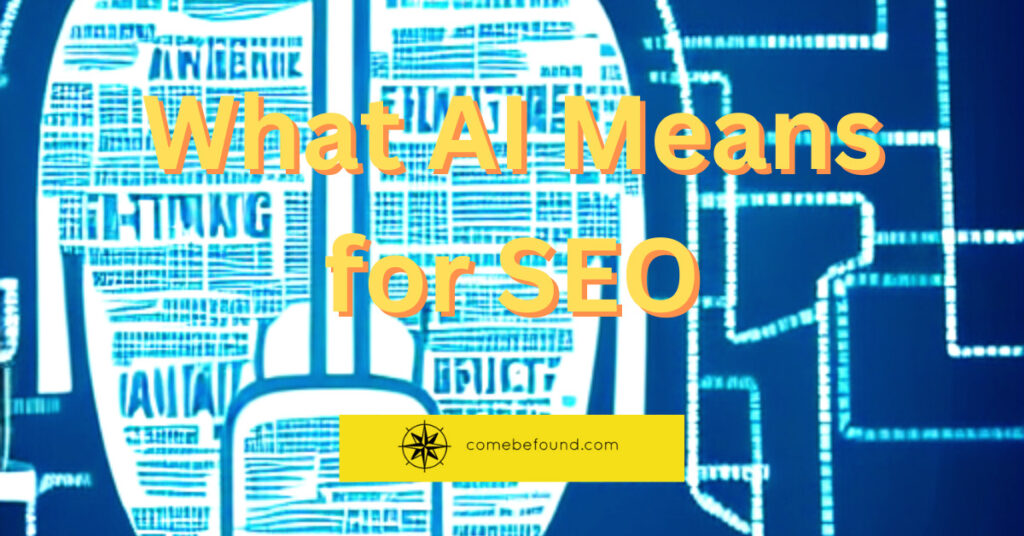Artificial Intelligence (AI) is not a new concept. It isn’t only the subject of fantasy stories and childhood dreams of the future either. AI is as much a part of our lives today as texting, and probably much more so than you currently think.
From personalized shopping to cybersecurity and fraud prevention, there are many different applications of many various types of AI that all work to provide you and I a better experience. Sometimes, the result makes our lives easier. Other times, we might say it causes more headaches than it solves. (After all, who hasn’t argued with their AI voice assistant on their smartphone or in their car, for example?)
The SEO world has had decades of experience with AI. As with any major software solution, search engines too leverage AI to perform various tasks. And on the other side, SEO’s have used AI to assist them with various tasks as well. Recently however, AI has taken the SEO and digital marketing world by storm again, with the advent of the latest GPT language models and ChatGPT.
In this article, we will discuss how Google views AI generated content, what AI means for SEO, and ways you can make the best use of AI and plan for the future.
Let’s get started!
How Does Google View AI Generated Content?
With the release of the recent Helpful Content Update and Spam Updates, AI generated content has come under fire because of the many issues that site’s that use them have become guilty of. Consider an example.
The other day I was looking up a recipe for shepherd’s pie. I searched for “the best shepherd’s pie recipe” and based on the meta description, found one that looked pretty good. And to be fair the recipe looked like it was good, but it was the site that left me with a bad taste in my mouth.

Easily 70% of the on-screen real estate is taken up by four individual ads. But the worst part, and the point of this article, is how far down the actual recipe is on the page! The whole reason why I am going here in the first place is buried about 70% of the way down the page. The majority of this page is mindless AI driven content for search terms that the owner hopes to rank for. How shepherd’s pie compares to other pies, the origin of shepherd’s pie, and what other foods go well with it. Look, I’m at the store and just need the recipe!
Sites like this create a frustrating user experience. And thankfully recent Google system updates have pushed (if there are better options) sites that do not do this higher in the results pages.
This was alluded to by Google’s own Danny Sullivan in a recent Tweet:

Essentially the issue is that content which is not helpful and just attempts to rank, regardless of the method, will be hit by the recent system updates Google pushed out.
What makes AI a prime culprit in this crime though, is that it is the worst out of all the methods. AI is fast, AI is cheap or even free, and AI is dirty by itself. In literally seconds, content can be generated and, in some cases, automatically published and posted without any quality control, assurance or fact checking.
AI generation tools have their place in content marketing, but the factors that Google and other search engines value, and the target audience who will be looking at that content, are going to suffer in a strictly AI environment.
ChatGPT has shined a light on this topic very clearly. Clearly, GPT (Generative Pre-trained Transformer) language models and the tools that make them useful are an incredible step forward in AI. The practical uses for these concepts are seemingly endless and can revolutionize education and daily life. But there is still a long way to go.


The result is essentially the Internet’s largest echo chamber that lacks authority and any source for its credibility. And at times it just flat-out presents wrong information.
What AI Means for SEO
AI generated content sounds good at first because so much of what is on the Internet is fluff. But when you consider the engineering behind GPT language models are essentially the product of someone or a collective of people “pre-training” it what to say, you quickly become aware that it is subject to error.
The danger is that the very nature of the act of posing a question and the lack of citations or sources in its response lends itself to taking the tool at face-value. Have fun with that.
ChatGPT and other similar AI tools will continue to get better, and that is very exciting to consider. However, in the world of SEO and content marketing, the already existing tools to detect plagiarism and unhelpful AI generated content will only get better too.
Instead, the goal of the content should be what Danny posted:

In order for content to meet these guidelines, it must be helpful, it must be reliable, and it must be people-first. Put another way, for content to perform well on search results, it must be a positive user experience that answers their question or provides them with the information they are looking for in a way that demonstrates it is from a reputable, experienced source who has documented use or experience with the subject in question.
In fact, Google has even doubled down on this and added an additional aspect to its quality rater guidelines. Not only do they look for E-A-T (Expertise, Authoritativeness, and Trustworthiness), but they added to that Experience (E-E-A-T or Double E-A-T). From their own published article on the topic, they state that “There are some situations where really what you value most is content produced by someone who has first-hand, life experience on the topic at hand.” Again, people-first, by humans for humans, information.
Leveraging AI to generate ideas for content is incredibly useful and a huge time saver. In fact, the main image for this article was generated with AI. However, it cannot generate content that has first-hand life experience on the topic. Likely then, that content will not wind up being helpful or valuable for the user.
That takes us to our next part of our article:
The Impact of AI for the Future
AI is a fast-evolving technology with great potential to make workers more productive, to make firms more efficient, and to usher in new innovations and new products and services. However, it can also have unintended, although not totally unexpected, consequences.
From automating driving cars to an AI “doctor” who could prescribe you medication, there are a lot of questions about where this technology will take us. But one question does not need to be asked, and that is if AI is a part of our future. Not only is it a part of our future, but it is also a part of our present.
With Microsoft in talks to invest $10 billion USD in OpenAI, the owner of ChatGPT, AI will clearly continue to be a part of the life of anyone in SEO. But so long as it is people who will be reading and looking for the information, the content will have to be helpful, reliable, and trustworthy.
But what about mankind? Why don’t we ask an AI itself and see:

Couldn’t have said it better myself.

